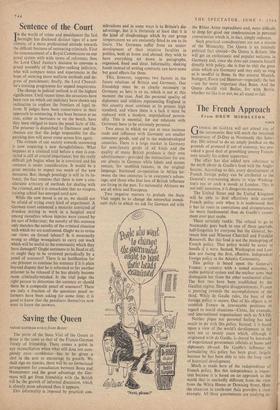Sentence of the Court
Ithe world of crime and punishment the last 'fortnight has disclosed distinct signs of a new climate, of a more professional attitude towards the difficult business of sentencing criminals. First the announcement of a Royal Commission on our penal system with wide terms of reference; then the Lord Chief Justice's decision to convene a grand assembly of the higher-ranking judiciary, who will compare notes and experiences in the hope of securing more uniform methods and de- grees of punishment; finally, the Lord Chancel- lor's training programme for unpaid magistrates.
The change in judicial outlook is of the highest significance. Until recent times the occasions have been rare on which our judiciary have shown any inclination to explore the frontiers of legal re- form. If judges have been conservative in their approach to sentencing, it has been because at no time, either as barristers or on the bench, have they been obliged to learn the penal facts of life. The prisoner is dispatched to Dartmoor and the chances are that the judge responsible for dis- patching him will never come across him again.
The- attitude of our society towards sentencing is now acquiring a new thoughtfulness. What happens at a criminal trial before a man is con- victed is still of crucial importance; but the really difficult job begins when he is convicted and his sentence is under consideration. It would be a great mistake to expect too much of the new measures. But, though penology is still in its in- fancy, the fact remains that there is now a con- siderable armoury of methods for dealing with the criminal, and it is remarkable that no weapon training school has emerged until now..
While the new mood is on us, we should not be afraid of trying every kind of experiment. A German court sentenced a motorist convicted of drunken driving to work in a hospital ward among casualties whose injuries were caused by his sort of behaviour; the novelty of this sentence only matches the novelty of the criminal situation with which we are confronted. Ought we to revise our views on forced labour? Is it necessarily wrong to oblige wrongdoers to carry out work which will be useful to the community which they have damaged? Ought sentences to be fixed at all, or ought they to be reviewed periodically by a panel of assessors? There is no justification for one prisoner to continue his sentence if it is plain beyond.dispute that he is reformed or for another prisoner to be released if he has plainly become more criminally-minded. Is the trial judge the right person to determine the sentence or should there be a composite panel of assessors? These are only a fraction of the questions penal re- formers have been asking for some time; it is good to know that the penalisers themselves now want to know the answers.






































 Previous page
Previous page